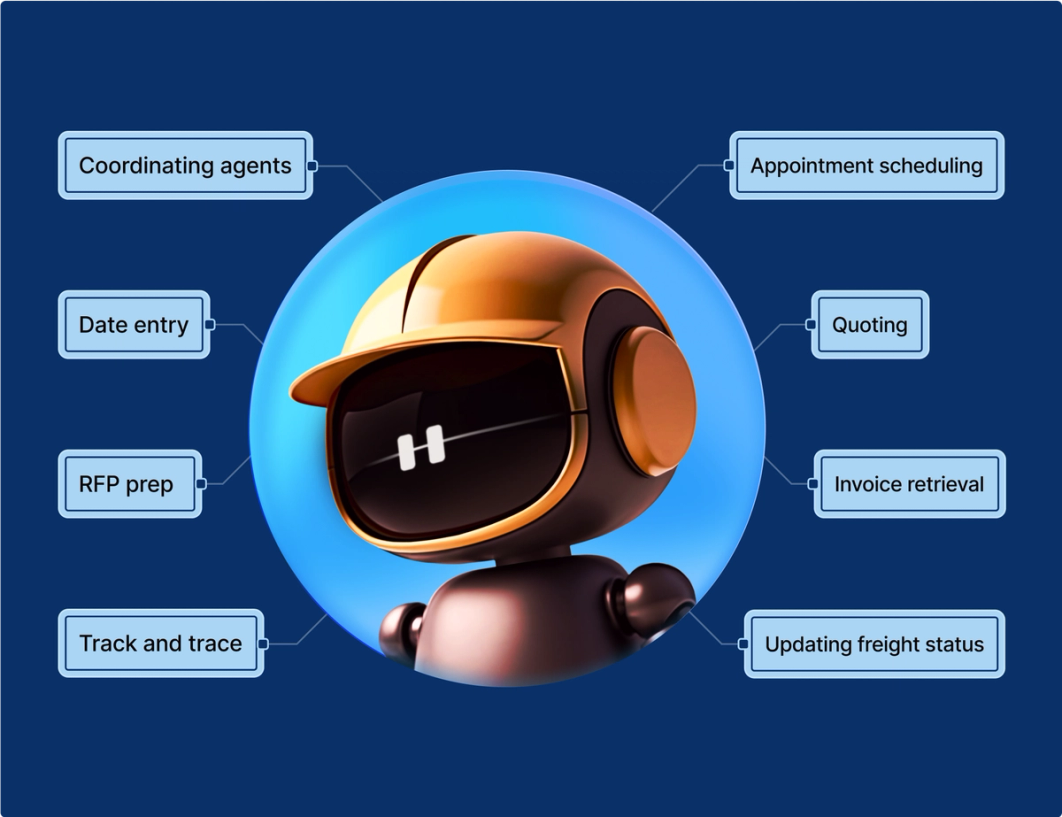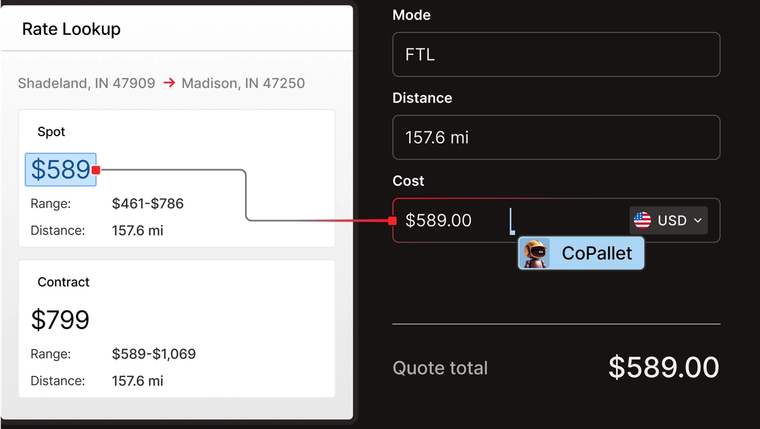Why Your Next Logistics Coordinator Hire Could Be an AI Agent


If you’re a logistics operator at a carrier, 3PL, or supply chain department, that probably sounds familiar. Growing volume doesn’t just mean bringing in more business. It means hiring, onboarding, and managing more people to handle the flood of repetitive, back office work. You are constantly onboarding new employees, teaching tribal knowledge, configuring IT systems, and running endless meetings. Meanwhile, the shipments never stop and your customers want updates and quotes fast.
Your team of logistics coordinators is doing the same work over and over again manually. They quote shipments, enter orders, contact carriers, track freight, process paperwork, chase PODs, and cross reference invoices. Each shipment often requires 20+ individual touches. It adds up quickly. For many companies, 10 percent of total revenue goes toward back office work alone.
But what if deploying AI agents to make your entire team 10x more efficient?
What is an AI agent?
An AI agent is a digital coworker that uses AI reasoning to complete tasks in the same way humans do. Unlike last-gen RPA or OCR tools, the AI that powers these agents enables them to handle unstructured language and understand user interfaces, not just follow pre-programmed scripts.
An AI agent consists of these 4 capabilities:
- Workflow: This is the AI agent’s ability to follow multi-step processes. Workflows can be customized to mirror your internal SOPs. For example, if a customer requests a quote, the agent extracts email details, checks rate tables, generates a quote, and replies.
- Tool Actions: These are the powers an AI agent has to interact with its environment. Think of it like giving an employee access to your tools. They can read PDFs using AI vision, click through a TMS, send emails, update spreadsheets, and even update 3rd party portals.
- Memory: Memory is what gives an AI agent context and continuity. With memory, AI agents don’t start from scratch every time, they remember how your business works.
- Short-term memory: What just happened—like the most recent email thread or a customer’s updated rate sheet.
- Long-term memory: Persistent knowledge such as your SOPs, client-specific preferences, and logistics terminology.
-
- Reasoning: Reasoning allows AI agents to make decisions when things aren’t black and white. They can understand emails and docs that are missing information. They can reply to an email asking for missing information or escalate a task to a supervisor when confidence is low. It’s how AI agents handle complexity instead of breaking down when things get messy.
A real example: Spot quoting
Imagine a freight broker gets an inbound email: “Can you get me a truck from Shadeland to Madison, picking up tomorrow?”
Here’s how an AI agent handles it:
- Workflow: It recognizes this is a quote request and initiates the quoting process.
- Memory: It recalls that this customer’s distribution center is 6100 Cedar Springs Rd, which requires calling ahead of an appointment.
- Tool actions: It logs into the DAT and pulls the market rate and applies a margin. It logs into the TMS and creates a quote.
- Reasoning: It decides which rate to present based on pickup timing and recent market trends.
In under 15 seconds, the customer gets a polished response, with no manual work involved.

Why you want AI on your ops team
- Infinite Scalability: AI agents can run hundreds or thousands of tasks in parallel, so you can scale up shipments without expanding headcount.
- Instant Responsiveness: Responding to “where’s my freight?” or quote requests in seconds is a competitive advantage to win more freight, get better rates, and provide premium service.
- Focus: When repetitive tasks run in the background reliably, your team can focus on what really moves the needle, like winning customers or expanding your carrier network.
Is AI performance reliable?
AI models do hallucinate and make mistakes, just like people. But when you have mission-critical tasks, like setting a reefer temperature or quoting a load, you can’t make mistakes.
To solve this, Pallet adopts an augmented AI approach, which means AI is supervised and audited by humans in the loop. We run every task through multiple AI models at the same time and compare the results. When there is a discrepancy, we escalate these low-confidence cases to a human.
Pallet assigns works to multiple AI models to independently make a decision and then compares the results. It's like assigning each task to multiple employees.

The future of logistics
Our perspective is that AI will automate all back office logistics tasks in the next 5 years. A single coordinator will be able to manage 10x more freight with the help of AI colleagues. Companies that embrace AI early will grow faster and more profitably than their peers, whether it’s through having a better cost structure or simply responding to every quote faster.
Interested in defining the future of logistics operational excellence? Connect with an AI deployment strategist to maximize efficiency of your operational spend.




